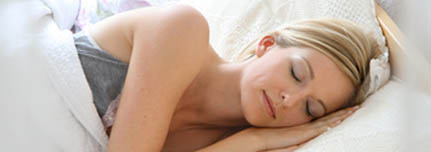We all need a good night’s sleep, just as much as we need food and drink. Because your muscles relax when you are asleep, vibrations arise in your throat – this is when snoring begins. It can often be a sign of a dangerous respiratory condition (sleep apnea), where the airways are obstructed. This can lead to cardiac and circulatory problems.
Those who snore generally do not know they snore nor when it happens. However, a dry mouth in the morning, hoarseness or a stiff neck can indicate that you have been snoring. The condition also increases with age; 60% of all men and 40% of all women over 60 years of age are snorers. Reduced tissue tone and excess weight can be contributory factors.
In sleep apnea, breathing stops for short periods and oxygen intake is considerably reduced. The brain registers these breathing pauses and responds by initiating frequent wake-up reactions, which means that the body is unable to recuperate properly during sleep. Exhaustion, increased daytime tiredness and a tendency to nod off are early warning signs that your health is in danger and that the heart and circulatory system are being put under strain.

Debilitating snoring and sleep apnea can be successfully prevented by the use of dental splints, similar to braces. These prostheses, made after impressions of the teeth have been taken, keep the lower jaw, tongue and soft palate in position while you sleep. This keeps the throat area open, stabilizes the weak muscles of the throat and allows enough air in so that you can breathe properly.
Your partner will also be grateful to be able to sleep peacefully and soundly again.




